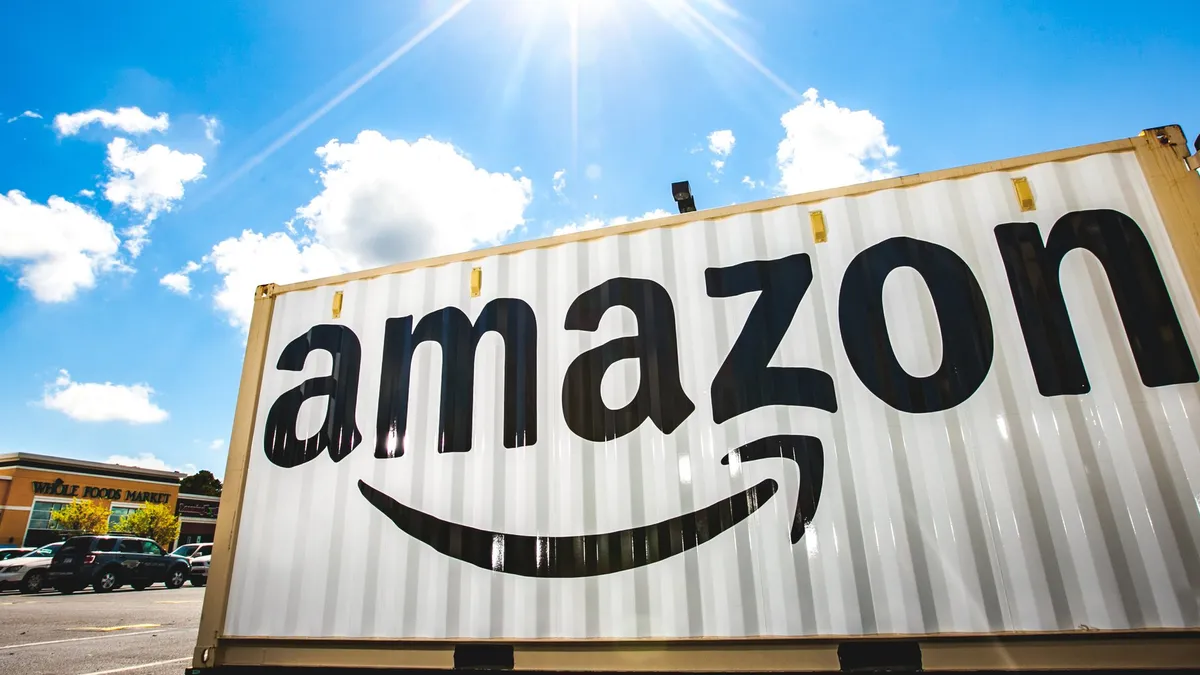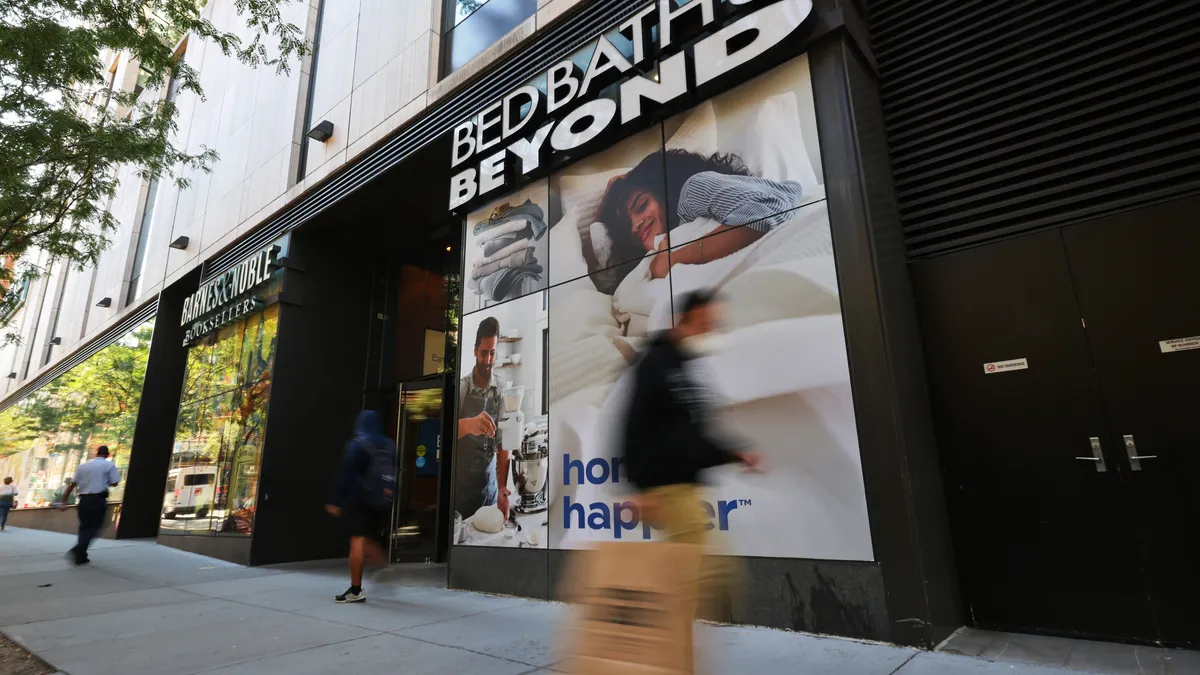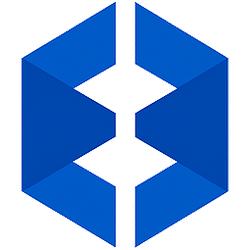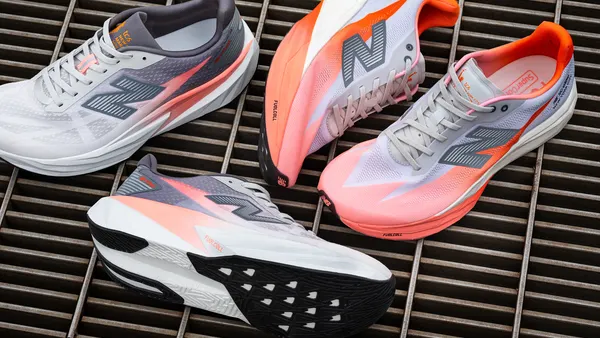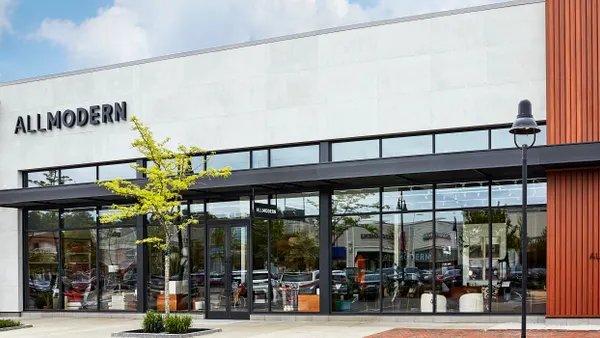Dive Brief:
- Under a program dubbed Amazon Accelerator, the e-commerce giant provides special perks to businesses that agree to be acquired for a fixed price at Amazon’s discretion, according to a report from the Wall Street Journal citing its review of a contract provided by unnamed sources. Sellers on its marketplace or businesses not currently selling on Amazon are eligible, an Amazon spokesperson told Retail Dive in an email.
- If Amazon decides to acquire a seller’s business, it can do so with 60 days’ notice for a price as low as $10,000, according to the Journal's report. Post-sale, the seller retains its designs, patents and trade secrets and is allowed to continue to sell the product if it’s rebranded, the Journal said.
- In a statement to Retail Dive, an Amazon spokesperson said that a seller's participation doesn’t guarantee an acquisition will happen, but that for Amazon it's an opportunity to expand its selection. "Amazon Accelerator creates new opportunities for manufacturers — including those who already offer products in our store and those who do not — to launch new brands and products and offer them directly to Amazon customers," the spokesperson said. "For customers, this program adds products to our assortment and allows us to offer an even wider selection of high-quality products at a great value."
Dive Insight:
Amazon's Accelerator effort has been covered elsewhere by various media outlets and analysts in the last couple of years. The Wall Street Journal's report that it involves such a quick and easy path to acquisition is news, according to experts who once worked at Amazon and now work with brands, including those selling on the company's third-party marketplace.
In fact, Amazon provides marketing advantages and other perks to third-party sellers through a variety of programs, some that involve fees from the sellers and some that don't, the experts said.
"In my eyes, it’s just a feature of dozens of the different programs where sellers get things like the free Vine, the Amazon review program, and the placements — nothing stood out that’s unfair," Fahim Naim, a former category manager at Amazon and now founder and CEO of e-commerce growth consulting firm eShopportunity, told Retail Dive in an interview. "The $10,000 certainly raised my eyebrow. If that number is accurate, it isn’t a norm from a corporate VC standpoint, and a lot of what Amazon is doing does seem consistent with the way traditional VCs work. I do think that they are trying to develop this pipeline of brands and incubate brands, or invest in brands they want an early look at, such as a Ring."
Amazon acquired smart-doorbell company Ring for an undisclosed amount in February 2018 after working with the brand. Aside from Accelerator, other Amazon investment programs include Launchpad, a curated selection of what Amazon says are especially innovative products, other curated efforts like "Amazon Luxury Beauty" and Amazon Lending, among others, he said.
The lean acquisition offer through Accelerator could make sense for brands with short-term goals or that sell ultra-trendy goods, according to Jon Reily, EVP of retail and e-commerce at Publicis Sapient, who spent 15 years at Amazon helping create lucrative business divisions there. Like Naim, he noted that the marketing perks on offer through Accelerator resemble other Amazon seller programs.
"It’s a mixed bag depending on what your short-to-medium term goals are. If you have a product that’s a fad — it’s a great deal," he told Retail Dive in an interview. "But if you’re looking at a long term piece, I would not engage in a contract like this."
The fact that Amazon has opened Accelerators to manufacturers not already on its Marketplace could mean that the program is geared, at least in part, to Chinese sellers, Naim said. Some 40% of Amazon's top sellers are based in China, up drastically from the 26% two years ago, according to a May report from Marketplace Pulse.
Wherever the sellers are based, though, the program is further evidence of how closely Amazon watches the potential of products and categories and how quickly it moves to bring out its own private labels when it gets evidence of bestsellers.
"Amazon has a few different flavors of private label. In some cases, it’s under Amazon’s brand like Presto or Amazon Basics and supplied by a manufacturer, as is traditionally done in [brick and mortar]," Melissa Burdick, president of e-commerce technology and services agency Pacvue, told Retail Dive in an email. "Manufacturers who care about brand recognition and growing their brand equity are not great candidates. But for others, who see this as a business opportunity and the numbers work for them, it could be."
For sellers, it can be a tricky business to gauge the pros and cons of participating in Amazon's seller programs. The Journal's report on Accelerator may help stoke the antitrust rhetoric swirling around the e-commerce giant at the moment, although it's nothing new or illegal, according to Naim and Reily.
"Amazon is where the customers are, so it doesn’t matter if you’re selling things out of your own bedroom or if you’re Procter & Gamble — that’s where you need to go," Reily said. "But Amazon’s long-term goals are to put you out of business —so that’s where the scary part is. This story will absolutely stoke the antitrust talk, and there’s been a lot of saber-rattling among Democrats running for office. But those laws were written for Standard Oil and AT&T and won’t apply to Amazon unless they rewrite them."



